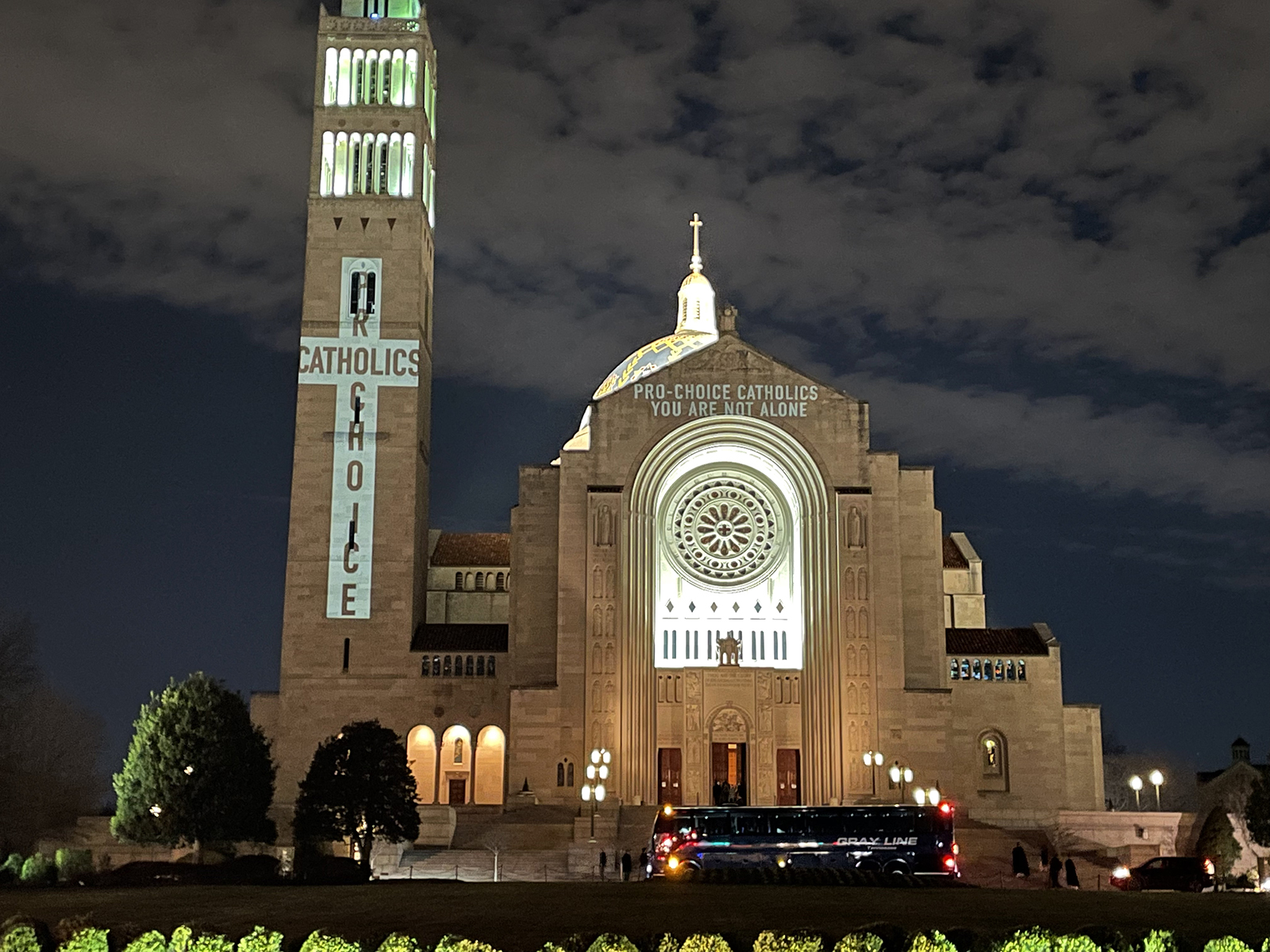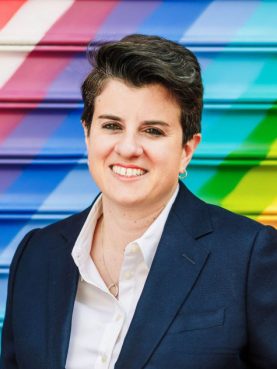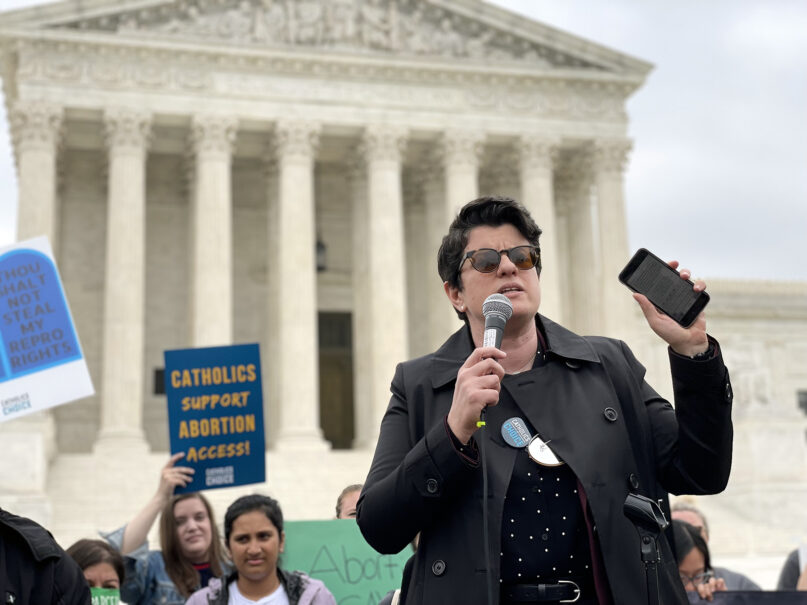(RNS) — Jamie Manson is a Catholic whose work is completely focused on the church while existing almost completely beyond the bounds of Catholic teaching.
The longtime author of the award-winning National Catholic Reporter column “Grace on the Margins,” Manson is president of Catholics for Choice, a nearly half-century-old group that advocates for abortion access in the face of the church hierarchy’s staunch opposition.
She doesn’t do it quietly. In January, Catholics for Choice demonstrated on the eve of this year’s March for Life, projecting images onto the walls of the Basilica of the National Shrine of the Immaculate Conception in Washington, D.C., as church leaders and abortion foes held a “prayer vigil for life” inside. One of the projections showed a statistic that 1 in 4 abortion patients is Catholic.
RELATED: An awakening is coming to American religion. You won’t hear about it from the pulpit.
Manson’s prayer at the demonstration captured both her stance on abortion and, implicitly, her critique of the church. “God of compassion, be present to all who have had abortions; may they feel your love,” she said. “Be with all abortion providers; may they be safe. Sustain them with your comfort, and your courage.”

Messages voicing support for abortion rights are projected onto the Basilica of the National Shrine of the Immaculate Conception in Washington, D.C., Jan. 20, 2021. The messages were part of a protest staged by the liberal advocacy group Catholics for Choice. RNS photo by Jack Jenkins
As an abortion-rights advocate and organizer and a lesbian, she is often asked why she doesn’t simply walk away and find a more comfortable spiritual home.
Part of her answer is she that wants to help Catholics at the margins claim their place as shapers of Catholicism’s future. But she also tells a story about her upbringing on Long Island, New York, with her Italian Catholic grandmother, who stopped going to church after being chastised by the local priest. Instead, her grandmother started a church in her own home. Growing up, Manson rarely went to church other than on major Christian holidays and had minimal contact with Catholic leadership.
She was nonetheless immersed in Catholic ritual and stories from her grandparents, and nearly everyone in her orbit considered themselves a Catholic. In her early teens, Manson even felt called to be a priest. Despite her family’s dissent and her own rejection from the church, today she still feels the church is her vocation.
Her path to leadership began while she was attending Yale Divinity School, where she met the renowned scholar Sister Margaret Farley. Farley taught her that Catholics have a sacramental view of the world, which holds that the sacred is in every person. In Manson’s words, “we are in a co-creative relationship with God. … Once you embrace a sacramental view of the world, these barriers that we place around the church fall away. It becomes impossible to say where the church begins and where it ends, for all and everything is sacred.”

Jamie Manson. Photo courtesy of Catholics for Choice
As she herself felt marginalized from Catholicism, then, she came to believe Catholicism offered the very theology that promised her belonging, and promised it to so many others. “If there is any one truth that has been regularly reinforced in the decades I’ve been living out this vocation, it is that God dwells on the margins, too.”
In 2005, she was hired as a pastoral associate and director of faith formation at St. Francis Xavier Catholic Church in Manhattan, a parish dedicated to supporting poor, homeless and LGBTQ people. In Xavier Manson found a church that supported the vision she’d formed at Yale. Women were encouraged to preach in services upstairs, while downstairs in the church basement nearly a thousand people were being fed regardless of gender identity or sexuality.
For Manson, this was the ultimate expression of Catholicism. “What I see now is a church that sends so many women and LGBTQ individuals away from the table, rather than feeding them and showing them God’s abundant, unlimited love for every one of God’s children.”
Since taking the leadership role at Catholics for Choice, Manson continues to encounter others struggling to find faith and belonging as she once did. Many like her are looking for meaning in Catholic tradition and are ready to hear the notion of God being within creation. “But when they see where the church hierarchy has put its energy and its resources and its money,” she said, “they find it odious. The hypocrisy of the church’s misogyny, homophobia and transphobia leads people to simply walk away. It’s a tragic loss for them and the church.”
Honoring the people who inspired her and helped her find belonging at the margins, Manson wants “to be with people who have been profoundly wounded by the church,” she said, “to try and reclaim the essence of Catholicism, to help its spirit survive, and to help people see the sacred within themselves, within other people, within the world.”
Manson’s work, while centering abortion, contraception and gender rights, is aimed at bringing American Catholicism closer to the reality of its adherents.
The Catholic Church in America is the country’s most racially diverse Christian denomination, reflecting seismic shifts taking place in the church’s demographics. Populated for generations by European immigrants who came to the United States from the late 19th to the mid-20th century, the church over the past 20 years has lost 18% of its membership, more than any other American faith tradition. Only 31% of American Catholics rate the honesty or ethical standards of their clergy as “high.”
In recent decades the church has again come to rely on immigrants for its growth, many of them struggling to find their footing in their new country.
Leaders like Manson suggest that a new Catholic leadership is rising to meet this new Catholic population. In facing her own rejection from the church, she, along with others, is choosing to reclaim Catholicism from a conservative American hierarchy that puts a primacy on dogma.
“I’ve looked to do this through my columns by giving voice to those who may not fit within the rigid structures of the church,” said Manson, “and, through Catholics for Choice, helping people feel their Catholic spirit calls them to action.”
RELATED: An immigrant Muslim finds his model of empowerment in Black American Islam
Like many religious reformers before her, Manson is creating the church she wants to belong to. “I can’t help but imagine the faith community I seek: one defined by a godly radical inclusivity, one that is in relationship with nature, one that welcomes all in communion around a shared table,” she said. “One in which work, prayer, education and shared meals all seek to create connection, so that the sacred is felt through knowing I, we, belong.”
The difference is she’s creating that church within the one she already belongs to.





